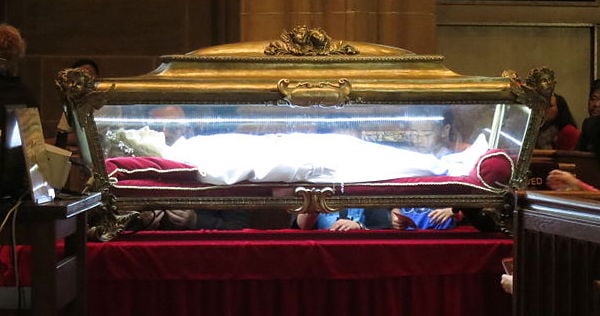
It is the feast of St. Maria Goretti, who on this day 114 years ago was stabbed 14 times and killed after resisting the sexual advances of her would-be rapist. It is not surprising that she herself, an innocent victim whose heart was close to Christ, should be recognized as a saint. Nor is it surprising that the grace of Christ should work through her such that her attacker repented, became a lay brother at a monastery, attended her canonization, and looked forward to being reunited with her in heaven.
But what is I think surprising – and possibly deeply damaging – is the assumption that all this is normative rather than miraculous – that all this should be simply a matter of course, the immediate experience of every Christian in similar situations. I say this because I suspect that, for many affected by rape, whether victims or those close to victims, the response to her story might be one of frustration, hatred, and anger, mixed with envy and self-reproach.
Mary Pezzulo at Steel Magnificat has already spoken well to the mistake of attributing Goretti’s sainthood to her preserved sexual purity – as though the fact of her not being raped somehow exonerates her, implicitly implicating those who have been raped rather than finding a way to be killed by their attackers instead. But another facet that bothers me is the apparent ease of forgiveness.
Not everyone can express forgiveness for their attackers as readily as St. Maria; not everyone can wish them so easily forgiven; and the thought of having them in the same church – let alone the same heaven – must seem appalling. Not that we should not learn to wish for the forgiveness and mercy seen in the relationship between Maria and her attacker – we should. But we also must remember that it is a deep and costly miracle, and the immediacy of it in her case cannot be expected in all cases, and certainly should not be forced or pretended.
As a way of awkwardly grappling with all this, I wrote the following poem. Yes, let us celebrate the life and death of St. Maria Goretti; let us request her prayers. But let us also remember that the miracle of her life was just that – a miracle – and that though we are bound by faith to expect miracles, the timing and nature of them will be just as God sees fit – and stories like St. Maria’s are beacons of possibility, not strict models of the way sainthood must be, but rather signals of the fact that sainthood – whether in this way or a very different way – can be.
To St. Maria Goretti
There are violations
Beyond tell of tongue;
Trespassing intimacies
We do not speak of;
Thefts the world cannot repay.
Those live who bear them in their bodies,
These marks where Christ was raped;
Those live who bear them,
A thousand daily things unnoticed,
Disrupted and turned odd;
Those live who bear them,
Surviving splinters,
Other to themselves.
Pray, pray for them,
Handled by evil;
Pray, pray – I know not what –
But grace is bountiful.
Pray, pray, for those lost in their own hearts;
Pray they find themselves
In the shelter of His wounds.
As for me, I cannot –
Am not so holy –
Cannot pray for those
Having shattered my friends;
Cannot pray save as the Psalmist,
“Smash in their teeth” and
“Let the righteous bathe in their blood.”
Pray me a heart that prays otherwise,
A heart begging holiness,
A heart not whispering,
“Holy, but perhaps not yet, perhaps not yet…”
Ah, pray me a wealth, a wealth of grace,
For forgiveness is costly,
Dear as the fierce particularity
Of broken love.












